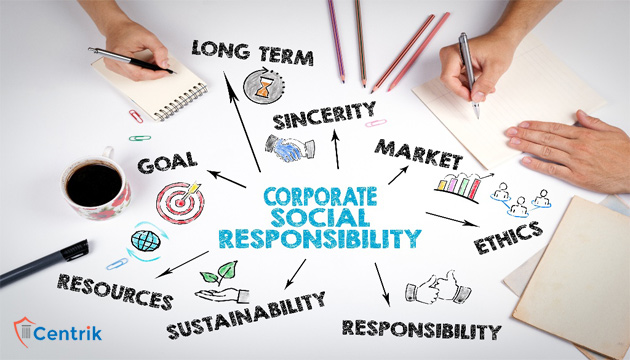It is no secret that the economy of Pakistan needs structural reforms in order to begin functioning adequately. And while many look to the government to fix most of Pakistan’s economic challenges, there are things that the private sector can and should be doing to help get the country’s economy back on track.
In this story, we cover two ways that Pakistan’s largest business are seeking to transform the nature of the Pakistani economy: lobbying, and philanthropy. The lobbying part of the story concerns the efforts of the Pakistan Business Council (PBC), a lobbying group that represents the interests of the largest companies in Pakistan, including the largest multinational companies operating in Pakistan. It seeks to advocate for the needs of larger businesses and push the government into adopting reforms that would benefit its members as well as the wider Pakistani economy.
And on the other end is Amen Tech, an endeavour of the Aman Foundation, which is the philanthropic organisation started by Arif Naqvi, the founder of Abraaj Capital, the Dubai-based private equity firm that recently entered into liquidation proceedings.
What these endeavours have in common is their effort to shape the Pakistani economy for the better through activities outside of the core businesses of the companies that sponsor them. They reflect an increasing understanding among some of the largest companies in Pakistan that they cannot ignore the larger socio-economic context in which they operate and that they must get involved in order to help
Each of these approaches involves a different element of what Pakistan’s larger companies believe is needed in Pakistan’s economy. The lobbying allows for the advocacy of policies they believe are necessary for economic growth. And the philanthropic activities such as those engaged in by the Aman Foundation help fill the gaps from where the government fails to provide services.
Pakistan Business Council (PBC)
Manufacturing is any developing economy’s backbone and Pakistan is prematurely moving away from it, which is especially concerning as the country has over 200 million consumers that can derive demand for locally manufactured goods. In addition, the huge market could give manufacturers the opportunity to achieve economies of scale and make it easier for them to compete in the global market. Pakistan’s share of manufacturing in the GDP had dropped from 17.5% in 2005 to 12.1% in 2018 and some large businesses are advocating for its increase with the slogan of “Make in Pakistan”.
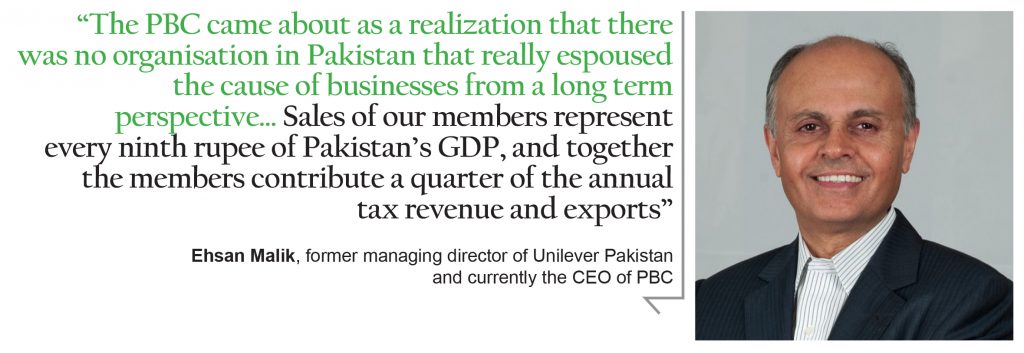
The Pakistan Business Council (PBC) is a lobbying group representing the interests of some of the largest companies in Pakistan. Its members include some of the largest local businesses as well as multinational corporations.
The PBC has recently taken up the mantle of emphasising the need for Pakistan to increase the share of manufacturing in its GDP and has organised seminars and conferences for its promotion. Profit sat down with Ehsan Malik, former managing director of Unilever Pakistan and currently the CEO of PBC, for a discussion about the role of PBC in Pakistan’s business landscape.
Established in 2005 with 14 members, PBC now has 80 members with 50 local businesses and 30 multinational corporations. “Sales of our members represent every ninth rupee of Pakistan’s GDP, and together the members contribute a quarter of the annual tax revenue and exports,” says Malik, highlighting PBC’s scale in the business sector.
Malik says that PBC was established because no organisation in Pakistan espoused the cause of business from a long term perspective.
The fluctuating economy and volatile business conditions often lead business to think short-term, and this is especially true for businesses that exist on a smaller scale. Such businesses often have to think on a day to day basis due to limitations in capital. “The PBC came about as a realization that there was no organisation in Pakistan that really espoused the cause of businesses from a long term perspective,” says Malik.
The way PBC does is that by conducting research, publishing policy papers and holding seminars and conferences to facilitate the flow of relevant information to all stakeholders in the country. It also works closely with relevant governments, ministries, and regulators and institutions to develop consensus on major issues which impact the conduct of business in Pakistan.
As part of its research, PBC recently published a report, in collaboration with the Consortium for Development Policy Research, about Pakistan’s readymade garment sector and its future in light of China Pakistan Economic Corridor. The report concludes that Pakistan has a huge opportunity ahead of it due to China’s transition away from low value-added garments and it can expand its share of exports by $170 billion.
Research is extremely vital for devising a long-term industrial strategy as it has to take into account the ground realities that affect the economy. Any policy that is devised based on data has a greater chance of addressing the underlying issues and can propose solid rectifying measures.
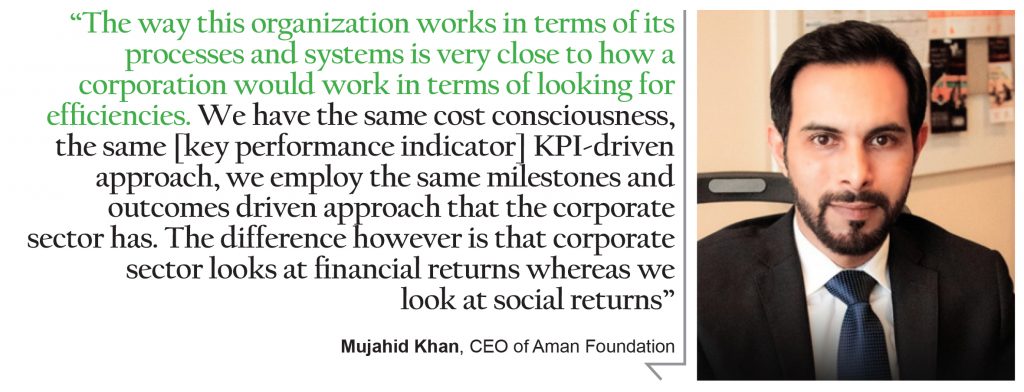
And in this regard, PBC has the unique advantage of being able to create a large scale impact since, under its belt, it has most of the biggest players in the country that represent all the major sectors.
While PBC’s core research focuses on economic indicators and industry related concerns, the Centre of Excellence in Responsible Business (CERB) — PBC’s in-house research wing — focuses on long-term sustainability and development that is socially inclusive. CERB specifically focuses on the environmental impact of production, gender inclusivity and business culture that ensures sustainability.
While PBC is advocating for Pakistan to increase its share of manufacturing in the aggregate output, which can therefore the overall GDP, and that too in a sustainable, inclusive manner, there’s another private sector organisation that’s providing a valuable resource to the economy i.e. labour.
Aman Tech
If Pakistan intends to achieve long term sustainable growth, then labor needs to be put at the center of its industrial strategy. The experience of East Asian ‘Tiger’ Economies points to the importance of human capital and knowledge and skills dissemination amongst the population. These countries achieved rapid and miraculously high growth rates in the period before 1990s largely due to their literacy strategies.
According to a report by UNDP Pakistan, around 135 million people in Pakistan are below the age of 35. To put that in perspective, that number is equal to the combined populations of Germany and England. Another report by UNDP states that an estimated 1.3 million young people enter the job market every year. It is the quality and outreach of Pakistan’s education that will decide the extent to which these young entrants are going to be a useful for the economic future of the country.
In Pakistan, there has been a mushrooming of universities offering management degrees and institutes imparting foreign certifications on finance and accounting. Respectable engineering schools and departments also dot the urban centers of the country. These are all important attempts by the private and the public sector to promote quality education but there are certain factors which limit these attempts from truly transforming the country’s industry.
The fact that most of the developments in higher education over the past decade or two are led by the private sector mean that there is a class-based exclusion. High tuition fees and open competition for the limited placements curb the participation of poor into such institutions.
And even in the public sphere of higher education, the phasing out of two-year undergraduate degrees unfairly discriminates against students coming from less privileged backgrounds as they have greater financial responsibilities and are often unable to stay out of employment for a period of four years after high school.
Founded in 2008 by Arif Naqvi and Fayeeza Naqvi, the Aman Foundations is one of the private philanthropic organizations that has been educating students not catered to by the mainstream higher education system in Pakistan. Aman Tech is a subsidiary of this foundation and offers technical and vocational trainings, employing what is known as the TVET model.
Aman boasts a placement rate of 65% and a graduation rate of 90% on their website. Both of these numbers are way ahead of what any other vocational training institute has been able to achieve. To learn more about their educational model and its importance for the larger economy, Profit sat down for a conversation with the CEO of Aman Foundation, Mujahid Khan at their head office in the heart of Karachi’s industrial district Korangi.
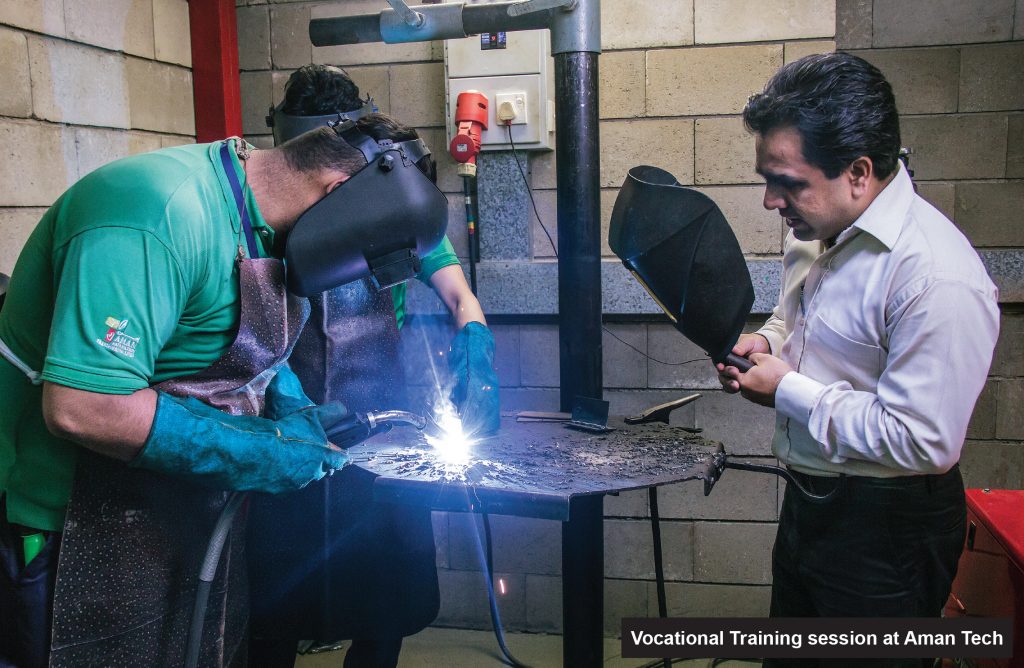
The very first differentiating factor that one would notice when visiting its Karachi office is that despite falling in the NGO category, its structure is much closer to a modern corporate entity than a typical imagining of a not-for-profit organization in Pakistan. The corporate ethos is also reflected in the profile of the CEO who has worked in leading firms in Pakistan and USA, and the way Aman Foundation works.
“The way this organization works in terms of its processes and systems is very close to how a corporation would work in terms of looking for efficiencies. We have the same cost consciousness, the same [key performance indicator] KPI-driven approach, we employ the same milestones and outcomes driven approach that the corporate sector has. The difference however is that corporate sector looks at financial returns whereas we look at social returns,” said Mujahid.
The goal of Aman Foundation is to produce labor that is efficient and can play its part in increasing the output of the company where they work. This has a direct consequence of increasing the total output of the country and reducing overall waste in the process which makes its products more competitive on a global scale.
“Everybody says that Pakistan’s competitive advantage is cheap labor, I don’t believe that cheap labor is a competitive advantage, however efficient labor is. And China is a good example of that. Labor cost in that country is not cheap, but why is Chinese production cheap is because they are efficient. Throwing bodies at a problem is not going to solve it, but adding skills and productivity into the mix is definitely going to help by creating efficiencies. That is how we look at it.” says Mujahid.
The reason Aman Tech has been able to achieve a placement rate nearing 70% is that they start with the end goal in mind. Since their primary aim is to get their graduating student placed into jobs, their programs are designed to cater to that goal. And this is achieved through meetings with an Industry Advisory board. Every 6 months they sit down with the advisory board to discuss with them the curriculum and trade offerings and tweak things around to reflect industry’s demands.
The feedback of industry then guides Aman Tech’s core activities such as curriculum design, hiring and training of teachers, planning for labs and assimilators. Only after they have planned their entire course do they recruit students. This ensures that students joining Aman Tech have an already planned cycle for them after which they meet a specific end goal i.e Placement.
Another reason for Aman Tech’s success is that they have always been open to tweaking their operations based on the industry feedback they get or the data they gather. Two such examples which Mujahid shared with Profit were their discontinuation of a course on carpentry because of a lack of demand in the industry for skilled carpentry graduates.
“There is very little formal economy that can absorb carpenters, we were providing it because we feel it is a great skill that is needed in the economy, but its demand was lacking. So we let go of that trade, as it just wasn’t creating the impact.”
The second tweaking Aman employed based on industry and data insight was shortening of their flagship program from 1 year to 6 months, while increasing of the training hours from half-day to full-day . The rationale behind this decision was that students would be able to graduate quicker and hence start earning earlier and also get a taste of a full work day. The intention with these changes is that students align themselves with actual work conditions as much as they can.
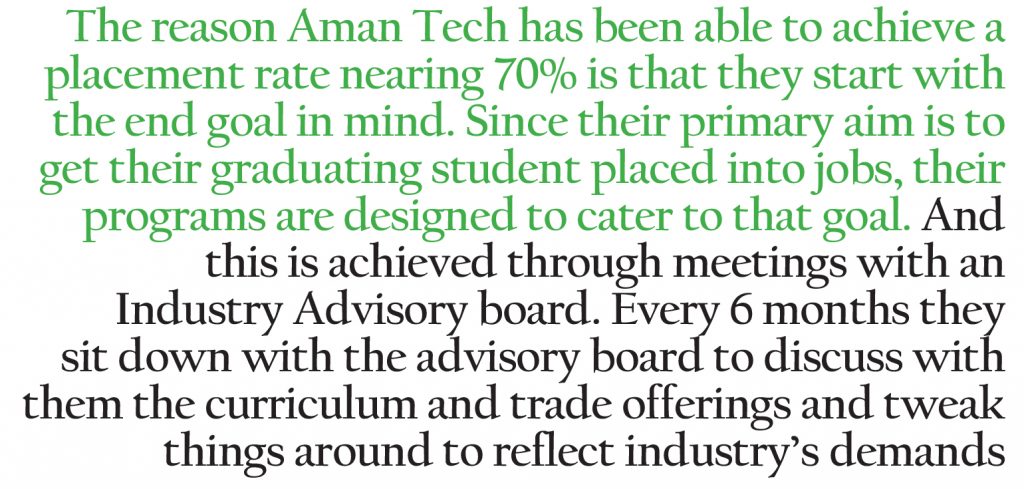
The full efforts of their research can be seen in the form of a policy paper published by Aman Foundation titled ‘Strengthening Skills’. The paper is based on extensive primary and secondary level research and propose several recommendations for the TVET sector in Pakistan based on its findings.
The policy paper identifies two successful models whereby TVET graduates are able to earn significantly above minimum wage, as a starting salary:
“1) TVET graduates of training programmes that have mandatory On the Job Training components built in with industry support, can earn up to 25% more in terms of starting salary as compared to those who go through a non OJT based model of training. However, formal OJT models have a cost attached to them, and need extensive commitment of time and resources from industry.
2) TVET graduates who become micro-entrepreneurs tend to start at a salary of Rs. 30,000 to Rs.35,000 a month, moving up to approximately Rs. 58,000 per month in 3 years. TVET institutions that provide some form of support to aspiring entrepreneurs, either via linkages to seed funding or lease to own models etc. are also able to better cater to the needs of female graduates, who often prefer to seek self employment, enabling them to work around barriers to mobility, yet earn well above minimum wage.”
And Aman has started to take these recommendations into account as well. WIth the start of their apprenticeship program, students are moved onto job sites for 2 months towards the end of their vocational training. Mujahid also announced the intentions of his organization to establish an incubation center for graduates of TVET education. He referred to this as micro-entrepreneurship whereby graduates will not only be able to gain self-employment and earn a much higher wage than the market, but also have the potential to grow into an SME organization, generating employment and serving as an important value chain in the industry.































